- Home
- Clive Barker
The Thief of Always Page 4
The Thief of Always Read online
Page 4
“No, not the ladder,” said Harvey.
“What then?”
“The thing in the sky.”
“Oh that…”
“What was it? A kite?”
“That wasn’t my doing,” Wendell replied.
“What was it then?”
“I don’t know,” Wendell said, his smile disappearing. “Better not to ask, eh?”
“But I want to know,” Harvey insisted, turning to Mrs. Griffin. “It had wings, and I think it flew off the roof.”
“Then it was a bat,” Mrs. Griffin said.
“No, this was a hundred times bigger than a bat.” He spread his arms. “Great, dark wings.”
Mrs. Griffin frowned as Harvey spoke. “You imagined it,” she said.
“I did not,” Harvey protested.
“Why don’t you just sit down and eat?” Mrs. Griffin replied. “If it wasn’t a bat then it wasn’t anything at all.”
“But Wendell saw it too. Didn’t you Wendell?”
He looked around at the other boy, who was digging into a steaming plate of turkey and cranberry sauce.
“Who cares?” Wendell said, chewing as he spoke.
“Just tell her you saw it.”
Wendell shrugged. “Maybe I did, maybe I didn’t. It’s Halloween night. There’s supposed to be bogeymen out there.”
“But not real ones,” said Harvey. “A trick’s one thing. But if that beast was real…”
As he spoke he realized he was breaking the rule he’d made on the porch: Whether the winged creature was real or not didn’t matter. This was a place of illusions. Wouldn’t he be happier here if he just stopped questioning what was real and what wasn’t?
“Sit down and eat,” Mrs. Griffin said again.
Harvey shook his head. His appetite had disappeared. He was angry, though he wasn’t quite sure at whom. Maybe at Wendell, for his shrugs; or at Mrs. Griffin, for not believing him; or at himself, for being afraid of illusions. Maybe all three.
“I’m going up to my room to change,” he said, and left the kitchen.
He discovered Lulu on the landing, staring out the window. Wind gusted against the glass, reminding Harvey of Rictus’s first visit. It wasn’t rain the gusts were bringing, however, it was powdery snow.
“It’ll be Christmas soon,” she said.
“Will it?”
“There’ll be presents for everyone. There always are. You should wish for something.”
“Is that what you’re doing?”
She shook her head. “No,” she said. “I’ve been here so long I’ve got everything I ever wanted. Would you like to see?”
Harvey said yes, and she led him up the stairs to her room, which was immense, and filled with her treasures.
She obviously had a passion for boxes. Tiny, jeweled boxes; large, carved boxes. A box for her collection of glass balls; a box that played tinkling music; a box into which half a hundred smaller boxes fitted.
She also had several families of dolls, who sat in blank-faced rows around the walls. But more impressive by far was the house from which the dolls had been exiled. It stood in the middle of the room, five feet high from step to chimney top, every detail of brick, slate and sill perfect.
“This is where I keep my friends,” Lulu said, and opened the front door.
Two bright green lizards came out to greet her, scurrying up her arms onto her shoulders.
“The rest are inside,” she said. “Take a look.”
Harvey peered through the windows, and found that every perfect room in the house was occupied. There were lizards lounging on the beds, lizards snoozing in the baths, lizards swinging from the chandeliers. He laughed out loud at their antics.
“Aren’t they fun?” Lulu said.
“Great!” he replied.
“You can come up and play with them any time you want.”
“Thanks.”
“They’re really very friendly. They only bite when they’re hungry. Here—”
She plucked one off her shoulder and dropped it into Harvey’s hands. It promptly ran up and perched on his head, much to Lulu’s amusement.
They enjoyed the company of both the lizards and each other for a long while, until Harvey caught a glimpse of his reflection in one of the windows, and remembered what a sight he was.
“I’d better go and wash,” he told Lulu. “I’ll see you later.”
She smiled at him. “I like you, Harvey Swick,” she said.
Hey honesty made him honest. “I like you too,” he told her. Then, his expression darkening, he said: “I wouldn’t want anything to happen to you.”
She looked puzzled.
“I saw you at the lake,” he said.
“Did you?” she replied. “I don’t remember.”
“Well anyway, it’s deep. You should be careful. You could slip and fall in.”
“I’ll be careful,” she said as he opened the door. “Oh, and Harvey?”
“Yes?”
“Don’t forget to wish for something.”
What shall I ask for? he wondered as he washed the dirt off his face. Something impossible maybe, to see just how much magic the House possessed. A white tiger, perhaps. A full-sized zeppelin? A ticket to the moon?
The answer came from the depths of his memory. He’d wish for a present he’d been given (and lost) a long time ago; a present that his father had made for him, which Mr. Hood, however much he might want to please his new guest, would never be able to duplicate.
“The ark,” he murmured.
With his face washed, and the scratches he’d got from the thorns in the thicket worn like war wounds, he headed back downstairs, to find that once again the House had performed an extraordinary transformation. A Christmas tree—so tall that the star at its summit pricked the ceiling—stood in the hallway, the colors of its twinkling lights seeping into every room. There was a smell of chocolate in the air, and the sound of carols being sung. In the living room, Mrs. Griffin was sitting beside a roaring fire, with Stew-Cat purring on her lap.
“Wendell’s gone outside,” she told Harvey. “There’s a scarf and gloves for you by the front door.”
Harvey went out onto the porch. The wind was icy, but it was already clearing the snow clouds, leaving the stars to shine down on a perfect white carpet.
Not quite perfect. A trail of tracks led down from the House to the spot where Wendell was building a snowman.
“Coming out?” he hollered to Harvey, his voice as clear as the bells that were ringing through the crisp air.
Harvey shook his head. He was so tired even the snow looked comfortable.
“Maybe tomorrow,” he said. “It’ll be back tomorrow, won’t it?”
“Of course,” Wendell yelled. “And the night after, and the night after…”
Harvey went back inside to look at the Christmas tree. Its branches were hung with strings of popcorn and cranberries, with colored lights and baubles and soldiers in gleaming silver uniforms.
“There’s something under there for you,” Mrs. Griffin said, standing at the living room door. “I hope it’s what you want, sweet.”
Harvey knelt down and pulled a parcel with his name on it out from under the tree. His pulse quickened before he even opened it, because he knew from its shape, and from the way it rattled, that his wish had been answered. He pulled at the string, remembering as he did so how much littler his hands had been the first time he’d held this gift. The paper tore and fell away, and there, shiny and new, was a painted wooden ark.
It was a perfect copy of the one his father had made. The same yellow hull, the same orange prow, the same wheel-house with holes in its red roof for the giraffes to put their heads through. The same lead animals, all in pairs, snug in the hold or peering through the portholes: two dogs, two elephants, two camels, two doves; all these and a dozen more. And finally, the same little Noah with his square white beard, and his fat wife, complete with apron.
“How did he know?” Harvey murmured.
>
He hadn’t intended the question to be heard, much less answered, but Mrs. Griffin. said: “Mr. Hood knows every dream in your head.”
“But this is perfect,” Harvey said in amazement. “Look, my dad ran out of blue paint when he was finishing the elephants, so one of them has blue eyes and the other one has green eyes. It’s the same. It’s exactly the same.”
“Does it please you then?” Mrs. Griffin asked.
Harvey said it did, but that wasn’t entirely the truth. It was eerie to have the ark back in his hands when he knew the real one had been lost; as though time had been turned on its heels, and he was a little kid again.
He heard Wendell stamping the snow off his feet at the front door, and was suddenly embarrassed to have such a childish present in his hands. He gathered it up in its wrapping and hurried away upstairs, intending to head back down for some supper.
But his bed looked too welcoming to be refused, and his stomach quite full enough for one night, so instead he closed the curtains on the gusty night and laid his head down on his pillow.
The Christmas bells were still ringing in some distant steeple, and their repetition lulled him into sleep. He dreamed that he was standing on the steps of his house, looking through the open door into its warm heart. Then the wind caught hold of him, turning him from the threshold, and carrying him away into a dreamless sleep.
VIII. Hungry Waters
That first day in the Holiday House, with all its seasons and its spectacles, set the pattern for the many that were to follow.
When Harvey woke the following morning, the sun was once again pouring through a crack in the curtains, but this time it lay in a warm pool on the pillow beside him. He sat up with a shout and a smile, and either one or the other (and sometimes both) remained on his lips for the rest of the day.
There was plenty to do. Work on the tree house in the spring morning, followed by food, and the laying of plans for the afternoon. Games and lazy hours in the heat of summer—sometimes with Wendell, sometimes with Lulu—then adventures by the light of a harvest moon. And finally, when the winter wind had blown out the flames in the pumpkin heads, and carpeted the grounds with snow, chilly fun for them all out in the frosty air, and a warm Christmas welcome when they were done.
It was a day of holidays, the third as fine as the second, and the fourth as fine as the third, and very soon Harvey began to forget that there was a dull world out beyond the wall, where the great beast February was still sleeping its tedious sleep.
His only real reminder of the life he’d left—besides a second telephone call he’d made to his mom and dad just to tell them all was well—was the present he’d wished for, and received, that first Christmas: his ark. He’d thought several times of trying it out on the lake, to see if it would float, but it wasn’t until the afternoon of the seventh day that he got around to doing so.
Wendell had made a real glutton of himself at lunch, and had declared that it was far too hot to play, so Harvey wandered down to the lake on his own, with the ark tucked under his arm. He half expected-hoped, in fact to find Lulu down there to keep him company, but the banks of the lake were empty.
Once he laid eyes on the gloomy waters he almost gave upon the idea of a launching, but that meant admitting something to himself that he didn’t wish to admit, so he headed on down to the shore, found a rock to perch on that looked less precarious than the others, and set his ark on the water.
It floated well, he was pleased to see. He pushed it to and fro for a little while, then lifted it out and peered inside to see if it was leaking. It was quite watertight, however, so he set it back on the lake and pushed it out again.
As he did so, he caught sight of a fish rising from the bottom of the lake, its mouth wide open, as if it intended to swallow his little vessel whole. He reached out to snatch the ark from the water before it was either sunk or devoured, but in his haste he lost his footing on the slime-slickened rock, and with a cry he fell into the lake.
The water was icy cold, and eager. It quickly closed over his head. He flailed wildly, trying not to imagine the dark depths beneath him, or the vast maw of the fish that had been rising from those depths. Turning his face up toward the surface, he started to swim.
He could see his ark floating above him, capsized by his fall. Its lead passengers were already sinking. He didn’t try and save them, but surfaced-gasping for breath—and paddled toward the shore. It wasn’t much of a distance. In less than a minute he was hauling himself up onto the rocks and scrambling away from the bank, water pouring from his sleeves and trousers and shoes. Only when his feet were well clear of the lake, and no hungry fish could snap at his toes, did he drop down onto the ground.
Though it was midsummer, and the sun was blazing somewhere overhead, the air around the lake was cold, and he soon began to shiver. Before he made his way out into the sun, however, he looked for some sign of his ark. The spot where it had sunk was marked by a forlorn flotilla of wreckage, all of which would soon join the rest of the ark at the bottom.
Of the fish that had seemed so eager to devour him there was no sign. Perhaps it had swum down into the depths to chew on the drowned menagerie. If so, Harvey hoped it choked on its dinner.
He’d lost plenty of toys before. He’d had a brand new bicycle—his prize possession!—stolen from the step of his house two birthdays ago. But this loss upset him as much; more, in fact. The idea that the lake now had something that he’d owned was somehow worse than a thief running off with his bike. A thief was warm flesh and blood; the lake was not. His possessions had gone into a nightmare place, full of monstrous things, and he felt as though a little part of himself had gone with it, down into the dark.
He walked away from the lake without looking back, but the breeze that came to warm his face when he broke through the thicket, and the sound of birds that pleased his ear, could not keep from his mind the thought he’d tried to ignore when he’d gone down to the water. Despite all entertainments that the Holiday House supplied so eagerly, it was a haunted place, and however hard he had tried to ignore his doubts and suppress his questions, they could be ignored and suppressed no longer. Whoever, or whatever, that haunter was, Harvey could not be content now until he’d seen its face and knew its nature.
IX. What Do You Dream?
Harvey didn’t mention what had happened at the lake to anyone—not even Lulu—in part because he felt stupid for falling in and in part because the House tried so hard to please him in the days that followed that he almost forgot about the accident entirely. That very night, in fact, he found a piece of colored string with his name tag on it at the base of the Christmas tree, and followed it through the House to find a new bike—even more splendid than the one he’d lost two years before—waiting for him.
But that was just the first of many fine surprises the Holiday House sprang in quick succession. One morning, for instance, Wendell and Harvey climbed up into the tree house to discover that the branches around it were swarming with parrots and monkeys. Another day, in the middle of Thanksgiving dinner, Mrs. Griffin called them through into the living room, where the flames of the fire had taken on the shapes of dragons and heroes, and were doing fiery battle in the grate. And in the heat of one lazy afternoon, Harvey was wakened from a doze by a chorus of shouts and found a troupe of mechanical acrobats performing clockwork-defying feats on the lawn.
The greatest surprise, however, began with the appearance of one of Rictus’s siblings.
“My name is Jive,” he said, stepping out of the early evening murk at the top of the stairs. Every muscle in his body seemed to be in motion: tics, jigs and jitterings that had wasted him away until he barely cast a shadow. Even his hair, which was a mass of oiled curls, seemed to hear some crazed rhythm. It writhed on his scalp in a knotted frenzy.
“Brother Rictus sent me along to see how you’re doin’,” he said, his tones succulent.
“I’m doing fine,” Harvey replied. “Did you say Brother Rictus?
”
“We’re from the same brood, loosely speaking,” Jive said. “I hope you call your family now and then.”
“Yep” said Harvey. “I called them yesterday.”
“Are they missin’ you?”
“Didn’t sound like it”
“Are you missin’ them?”
Harvey shrugged. “Not really,” he said.
(This wasn’t strictly true—he had his homesick days—but he knew if he went back home he’d be in school the day after, and wishing he’d stayed in the Holiday House a while longer,)
“You’re going to make the most of bein’ here then?” said Jive, practicing a weird little dance step up and down the stairs.
“Yeah,” said Harvey. “I just want to have fun.”
“Who doesn’t?” Jive grinned, “who doesn’t?” He sidled up to Harvey, and whispered: “Speakin’ of fun…”
“What?’’ said Harvey.
“You never did get Wendell back for that trick of his.”
“No, I didn’t,” said Harvey.
“Why the heck not?”
“I could never think of a way.”
“Oh I’m sure we could cook something up between the two of us,” Jive replied mischievously.
“It has to be something he’ll never think of,” Harvey said.
“That shouldn’t be difficult,” said Jive. “Tell me, what’s your favorite monster?”
Harvey didn’t have to think hard about that. “A vampire,” he said with a grin. “I found this great mask—”
“Masks are a good beginning,” Jive said, “but vampires need to swoop out of the mist,” he spread his arms, curling his long fingers like the claws of some eye-gouging beast “—swoop down, snatch up their prey, then rise up again, up against the moon. I can see it now.”
“So can I,” said Harvey. “But I’m not a bat.”
“So?”
“So how do I swoop?”
“Ah,” said Jive. “We’ll have Marr work on that for us. After all, what’s a Halloween without a transformation or two?” He consulted the grandfather clock on the landing. “We’ve still got time to do it tonight. You go down and tell Wendell you’ll meet him outside. I’ll go up on to the roof and find Marr. You meet us up there.”

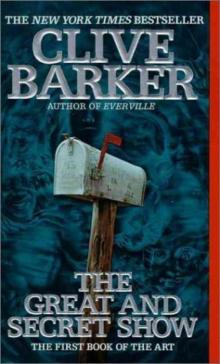 The Great and Secret Show
The Great and Secret Show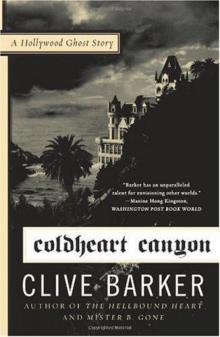 Coldheart Canyon: A Hollywood Ghost Story
Coldheart Canyon: A Hollywood Ghost Story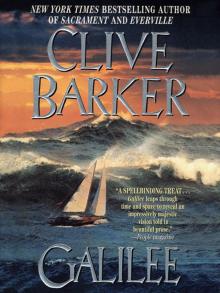 Galilee
Galilee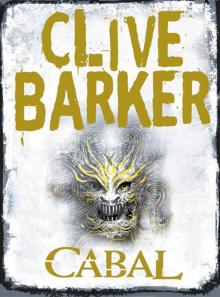 Cabal
Cabal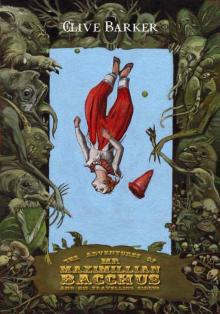 The Adventures of Mr. Maximillian Bacchus and His Travelling Circus
The Adventures of Mr. Maximillian Bacchus and His Travelling Circus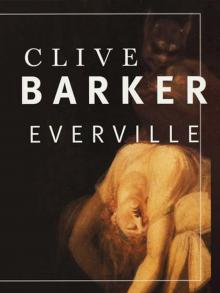 Everville
Everville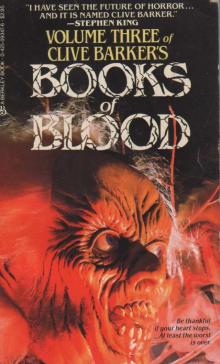 Books of Blood: Volume Three
Books of Blood: Volume Three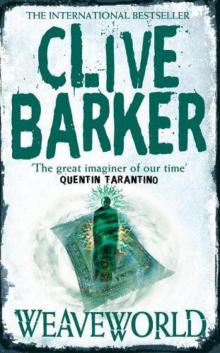 Weaveworld
Weaveworld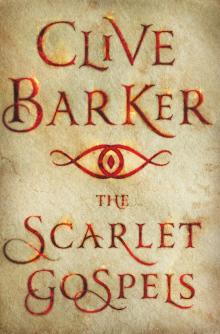 The Scarlet Gospels
The Scarlet Gospels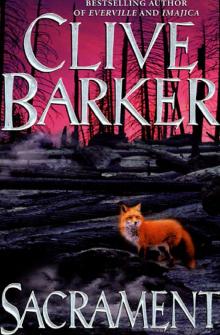 Sacrament
Sacrament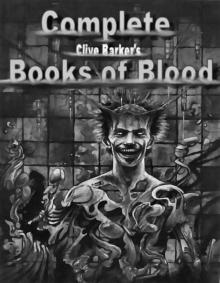 Books of Blood: Volumes 1-6
Books of Blood: Volumes 1-6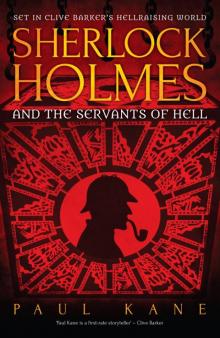 Sherlock Holmes and the Servants of Hell
Sherlock Holmes and the Servants of Hell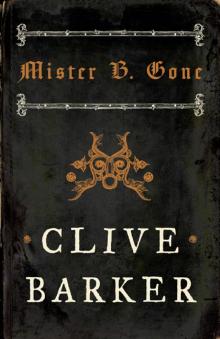 Mister B. Gone
Mister B. Gone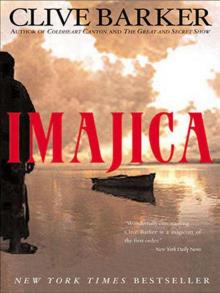 Imajica
Imajica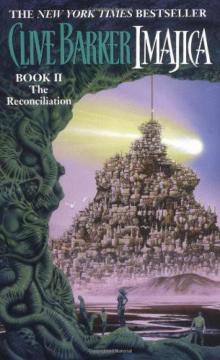 The Reconciliation
The Reconciliation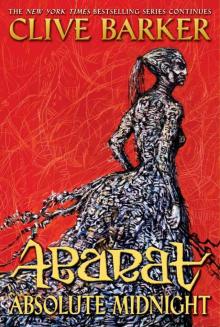 Abarat
Abarat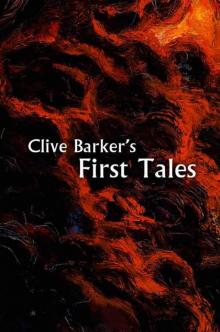 Clive Barker's First Tales
Clive Barker's First Tales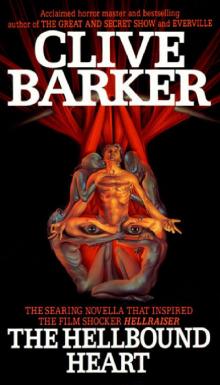 The Hellbound Heart
The Hellbound Heart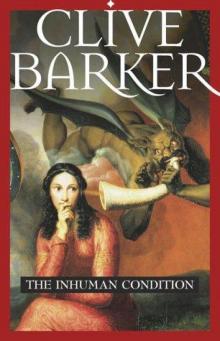 The Inhuman Condition
The Inhuman Condition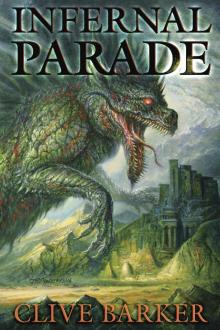 Infernal Parade
Infernal Parade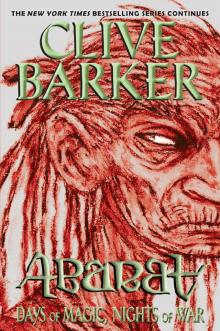 Days of Magic, Nights of War
Days of Magic, Nights of War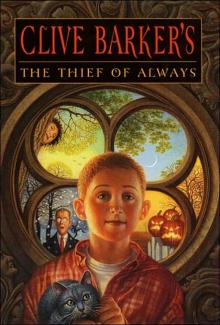 The Thief of Always
The Thief of Always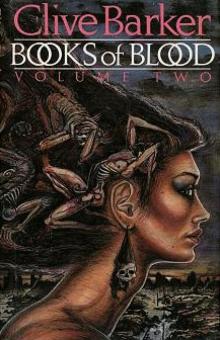 Books of Blood Vol 2
Books of Blood Vol 2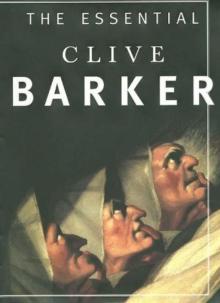 The Essential Clive Barker
The Essential Clive Barker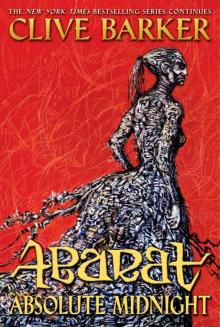 Abarat: Absolute Midnight a-3
Abarat: Absolute Midnight a-3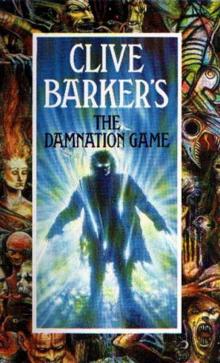 The Damnation Game
The Damnation Game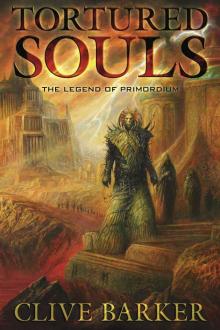 Tortured Souls: The Legend of Primordium
Tortured Souls: The Legend of Primordium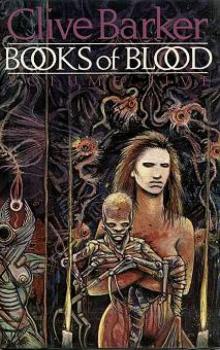 Books of Blood Vol 5
Books of Blood Vol 5 Imajica 02 - The Reconciliator
Imajica 02 - The Reconciliator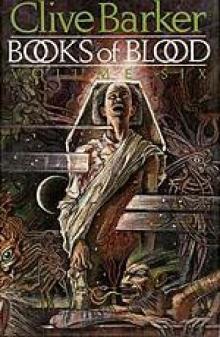 Books Of Blood Vol 6
Books Of Blood Vol 6 Imajica 01 - The Fifth Dominion
Imajica 01 - The Fifth Dominion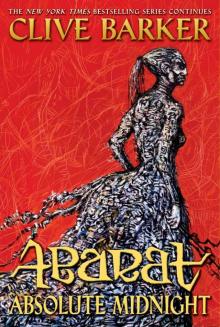 Abarat: Absolute Midnight
Abarat: Absolute Midnight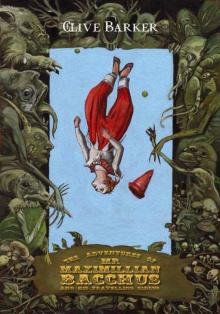 The Adventures of Mr. Maximillian Bacchus & His Traveling Circus
The Adventures of Mr. Maximillian Bacchus & His Traveling Circus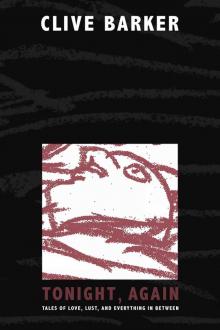 Tonight, Again
Tonight, Again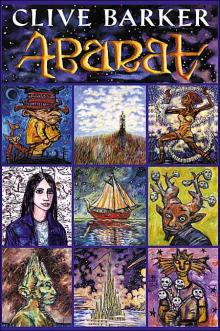 Abarat: The First Book of Hours a-1
Abarat: The First Book of Hours a-1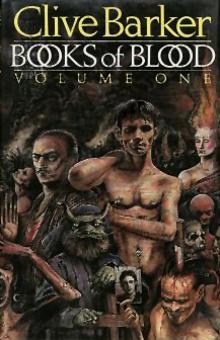 Books Of Blood Vol 1
Books Of Blood Vol 1 Age of Desire
Age of Desire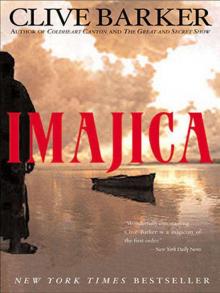 Imajica: Annotated Edition
Imajica: Annotated Edition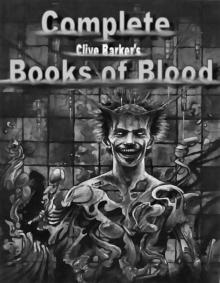 Complete Books of Blood
Complete Books of Blood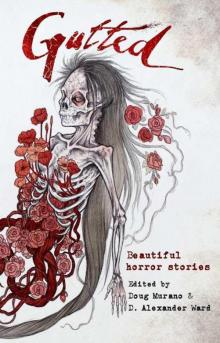 Gutted: Beautiful Horror Stories
Gutted: Beautiful Horror Stories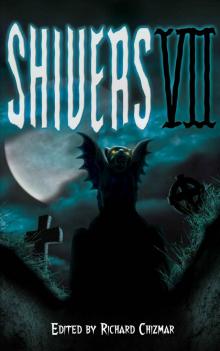 Shivers 7
Shivers 7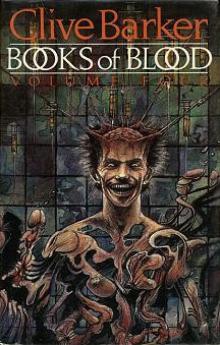 Books Of Blood Vol 4
Books Of Blood Vol 4